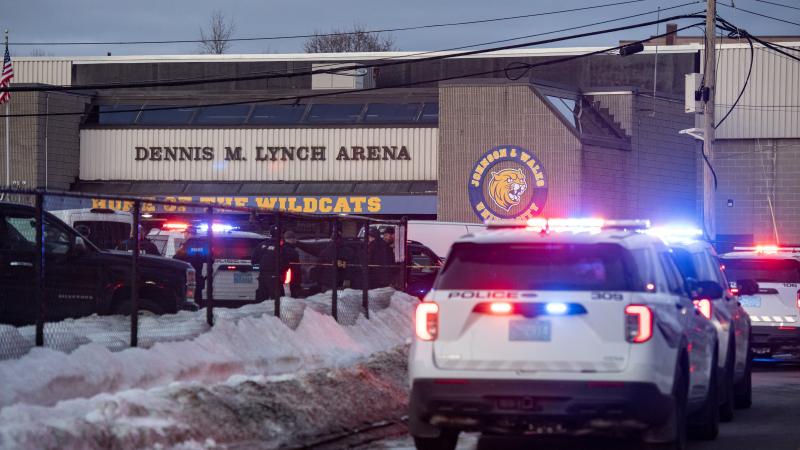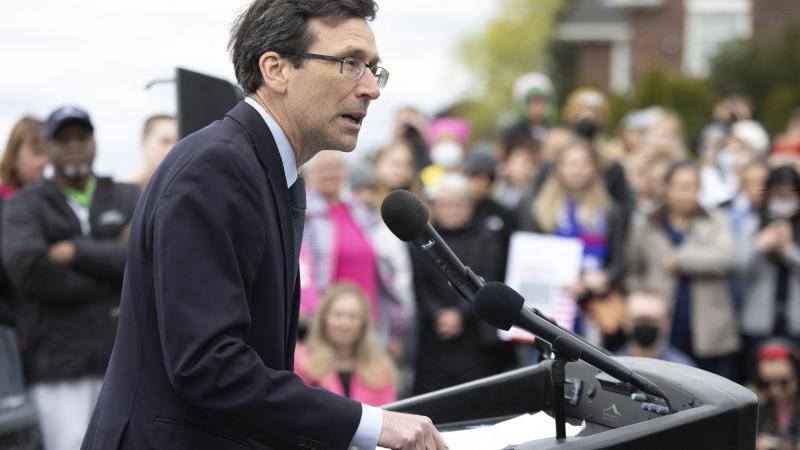Fulton County DA says ‘train is coming’ for Trump, his co-defendants, but obstacles remain
And though he allowed Willis to stay on the case, Judge McAfee did say there were “reasonable questions” about both Willis's and Wade's truthfulness when they testified at the hearings.
Fulton County District Attorney Fani Willis says “the train is coming,” suggesting that she and her team in Georgia are continuing to prepare for the trial against former President Donald Trump and the 14 remaining co-defendants for alleged election interference.
Her comments Saturday came despite the recent attempt to have her removed from the case for an alleged conflict of interest.
The defendants are accused of engaging in racketeering and conspiracy to overturn the results of the 2020 presidential election in Georgia.
Following more than two months of hearings and other court actions earlier this year looking into whether Willis should be removed from the case over a conflict of interest or an appearance of a conflict of interest, Willis was allowed to remain on the case, providing that her former lover and special prosecutor on the case, Nathan Wade, withdrew, which he did.
Willis and Wade fought back against accusations that their romantic engagement began before she hired him, and that she benefitted from the more than $700,000 that his law firm received for his work on the case, through luxury trips they took together.
“While that was going on, we were writing responsive briefs, we were still doing the case in a way that it needed to be done. I don’t feel like we’ve been slowed down at all. I do think there are efforts to slow down this train, but the train is coming,” Willis said Saturday, according to CNN, while attending an Easter basket giveaway.
“We’re not going to miss or skip a beat because of all the noise or distraction on one case. We’re going to continue to do our work,” Willis said.
Last week, Fulton County Superior Court Judge Scott McAfee, who is overseeing the case, granted requests from Trump and his co-defendants to appeal the decision to let Willis continue prosecuting the case. This is likely to throw a wrench into Willis’ stated goal of starting the trial in August, just three months before the presidential election between the two presumptive candidates, Donald Trump and President Joe Biden.
And though he allowed Willis to stay on the case, he did say there were “reasonable questions” about both Willis's and Wade's truthfulness when they testified at the hearings.
“However, an odor of mendacity remains,” McAfee wrote in his decision to allow her to stay on the case. “The Court is not under an obligation to ferret out every instance of potential dishonesty from each witness or defendant ever presented in open court. Such an expectation would mean an end to the efficient disposition of criminal and civil proceedings.”
Earlier this month, McAfee quashed six of the charges against Trump and his remaining co-defendants. Four of them have already pleaded guilty, according to The New York Times.
One of those charges that was thrown out relates to Trump’s telephone call to Georgia Secretary of State Brad Raffensperger on Jan. 2, 2021, in which he asked him to “find” enough votes to give him the victory in Georgia. This has been a key to this case, determining whether Trump believed there was enough identifiable voter fraud to change the result in Georgia, or if he was asking Raffensperger to manufacture enough votes.
Andy McCarthy, a former Assistant U.S. Attorney who has prosecuted many racketeering cases, wrote in National Review that both Willis and Wade should have been disqualified from the case.
He added if she, Wade, and the Fulton County DA’s office are disqualified, "the case may go to competent prosecutors who recognize it for what it is: not one huge, unwieldy wannabe RICO [racketeering], but a diffuse collection of bumbling initiatives by loosely connected actors, including Trump himself, who wanted to reverse Biden’s victory. They were not a racketeering enterprise, but they may well have done a number of things that, though less egregious, violated the criminal law.”














